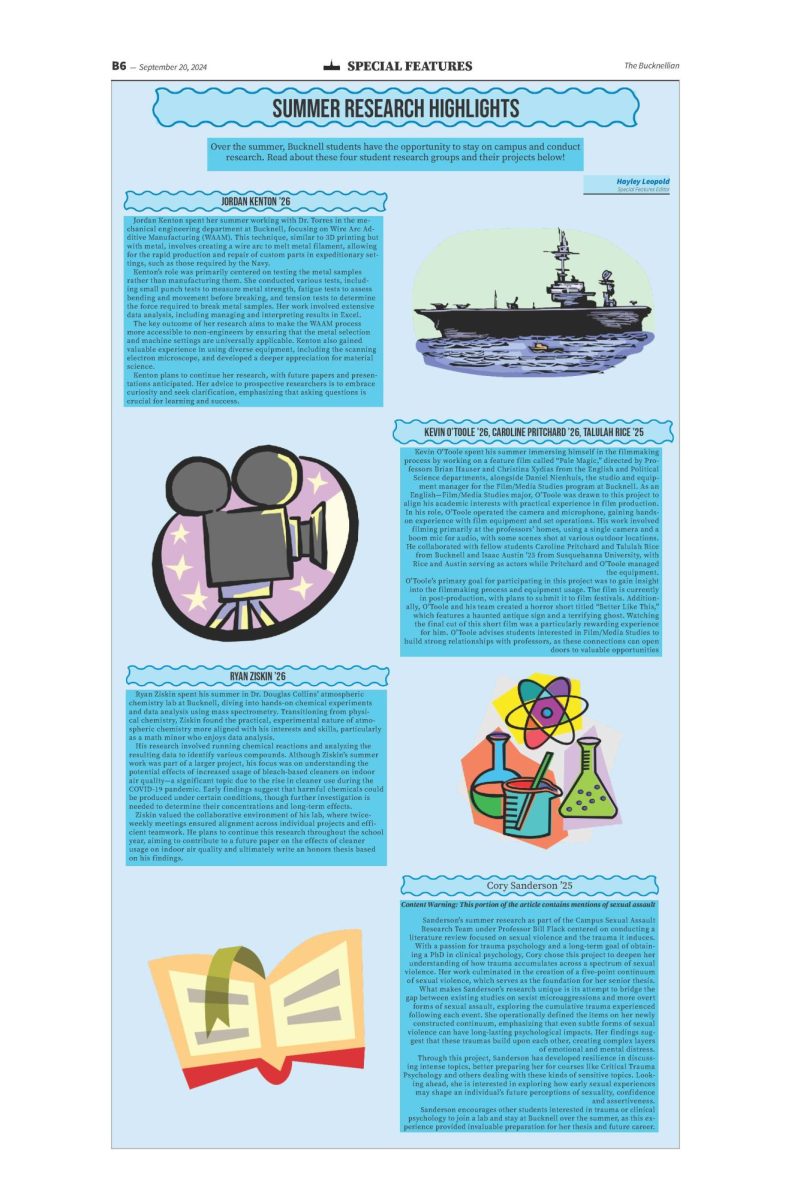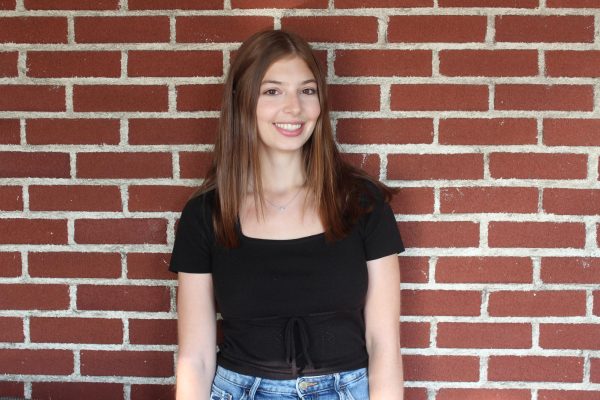Content Warning: This article contains mentions of sexual assault
Over the summer, Bucknell students have the opportunity to stay on campus and conduct research. Read about these four student research groups and their projects below!
Jordan Kenton ’26
Jordan Kenton spent her summer working with Dr. Jonathan Torres in the Mechanical Engineering department at Bucknell, focusing on Wire Arc Additive Manufacturing (WAAM). This technique, similar to 3D printing but with metal, involves creating a wire arc to melt metal filament, allowing for the rapid production and repair of custom parts in expeditionary settings, such as those required by the Navy.
Kenton’s role was primarily centered on testing the metal samples rather than manufacturing them. She conducted various tests, including small punch tests to measure metal strength, fatigue testing to assess durability under repeated cyclic loads and tension tests to determine the force required to break metal samples. Her work involved extensive data analysis, including managing and interpreting results in Excel.
The key outcome of her research aims to make the WAAM process more accessible to non-engineers by ensuring that the metal selection and machine settings are universally applicable. Kenton also gained valuable experience in using diverse equipment, including the scanning electron microscope, and developed a deeper appreciation for material science.
Kenton plans to continue her research, anticipating future papers and presentations. Her advice to prospective researchers is to embrace curiosity and seek clarification, emphasizing that asking questions is crucial for learning and success.
Kevin O’Toole ’26, Caroline Pritchard ’26, Talulah Rice ’25
Kevin O’Toole spent his summer immersing himself in the filmmaking process by working on a feature film called “Pale Magic,” directed by Professors Brian Hauser and Christina Xydias from the English and Political Science departments, alongside Daniel Nienhuis, the studio and equipment manager for the Film/Media Studies program at Bucknell. As an English—Film/Media Studies major, O’Toole was drawn to this project to align his academic interests with practical experience in film production.
In his role, O’Toole operated the camera and microphone, gaining hands-on experience with film equipment and set operations. His work involved filming primarily at the professors’ homes, using a single camera and a boom mic for audio, with some scenes shot at various outdoor locations. He collaborated with fellow students Caroline Pritchard and Talulah Rice from Bucknell and Isaac Austin ’25 from Susquehanna University, with Rice and Austin serving as actors while Pritchard and O’Toole managed the equipment.
O’Toole’s primary goal for participating in this project was to gain insight into the filmmaking process and equipment usage. The film is currently in post-production, with plans to submit it to film festivals. Additionally, O’Toole and his team created a horror short titled “Better Like This,” which features a haunted antique sign and a terrifying ghost. Watching the final cut of this short film was a particularly rewarding experience for him. O’Toole advises students interested in Film/Media Studies to build strong relationships with professors, as these connections can open doors to valuable opportunities.
Ryan Ziskin ’26
Ryan Ziskin spent his summer in Dr. Douglas Collins’ atmospheric chemistry lab at Bucknell, diving into hands-on chemical experiments and data analysis using mass spectrometry. Transitioning from physical chemistry, Ziskin found the practical, experimental nature of atmospheric chemistry more aligned with his interests and skills, particularly as a math minor who enjoys data analysis.
His research involved running chemical reactions and analyzing the resulting data to identify various compounds. Although Ziskin’s summer work was part of a larger project, his focus was on understanding the potential effects of increased usage of bleach-based cleaners on indoor air quality—a significant topic due to the rise in cleaner use during the COVID-19 pandemic. Early findings suggest that harmful chemicals could be produced under certain conditions, though further investigation is needed to determine their concentrations and long-term effects.
Ziskin valued the collaborative environment of his lab, where twice-weekly meetings ensured alignment across individual projects and efficient teamwork. He plans to continue this research throughout the school year, aiming to contribute to a future paper on the effects of cleaner usage on indoor air quality and ultimately write an honors thesis based on his findings.
Cory Sanderson ’25
Sanderson’s summer research as part of the Campus Sexual Assault Research Team under Professor Bill Flack centered on conducting a literature review focused on sexual violence and the trauma it induces. With a passion for trauma psychology and a long-term goal of obtaining a PhD in clinical psychology, Cory chose this project to deepen her understanding of how trauma accumulates across a spectrum of sexual violence. Her work culminated in the creation of a five-point continuum of sexual violence, which serves as the foundation for her senior thesis.
What makes Sanderson’s research unique is its attempt to bridge the gap between existing studies on sexist microaggressions and more overt forms of sexual assault, exploring the cumulative trauma experienced following each event. She operationally defined the items on her newly constructed continuum, emphasizing that even subtle forms of sexual violence can have long-lasting psychological impacts. Her findings suggest that these traumas build upon each other, creating complex layers of emotional and mental distress.
Through this project, Sanderson has developed resilience in discussing intense topics, better preparing her for courses like Critical Trauma Psychology and others dealing with these kinds of sensitive topics. Looking ahead, she is interested in exploring how early sexual experiences may shape an individual’s future perceptions of sexuality, confidence and assertiveness.
Sanderson encourages other students interested in trauma or clinical psychology to join a lab and stay at Bucknell over the summer, as this experience provided invaluable preparation for her thesis and future career.





















